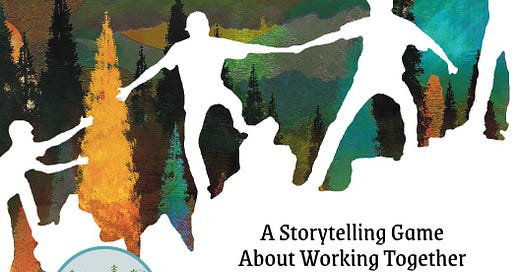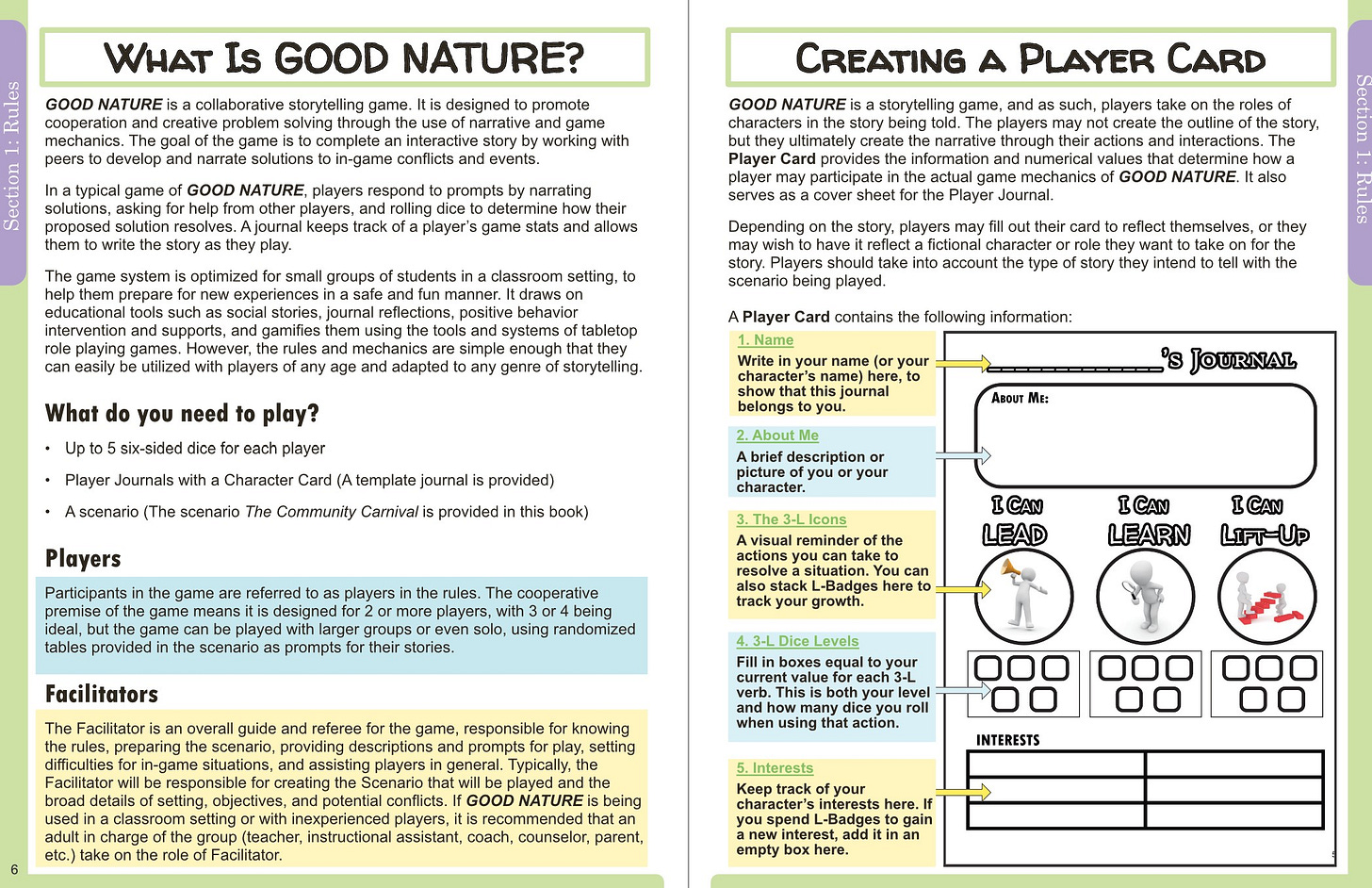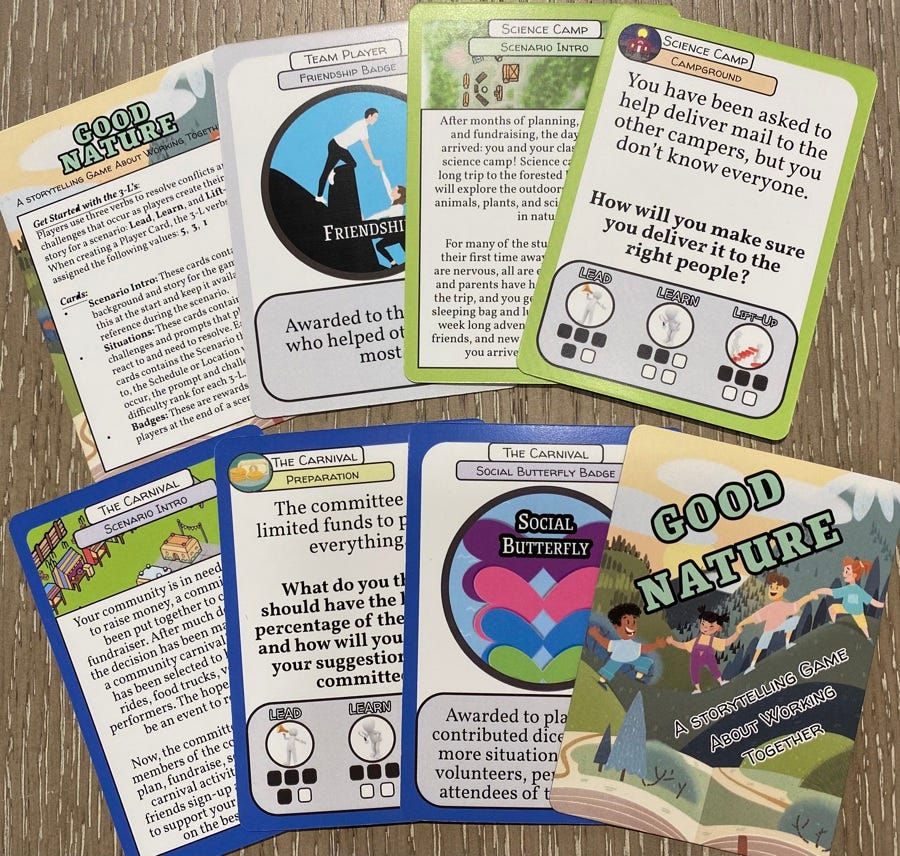Design Diary: Good Nature
The MonarcWriter newsletter returns from the holidays with a look at the design of a classroom TTRPG: Good Nature!
Happy New Year, everyone! It is the end of the holiday season and a return to work and school. As a teacher, I try to make the weeks after the holidays as fun as possible, with games a big part of my lesson plans to remind my students that school can be something they enjoy. This month, I’m bringing that same energy to the MonarcWriter newsletter, with a focus on how I use games in the classroom! For week one of January, we begin with a look back at the design process for a game very dear to me as a designer, educator, and parent: Good Nature, the first original TTRPG I ever published!
“GOOD NATURE is a cooperative storytelling game that uses simple dice-matching mechanics and journaling to encourage collaboration and creative problem-solving. The simple game mechanics are easily adaptable to any audience and genre of storytelling, but are designed for use with students in a classroom setting. A collaborative system helps develop writing and discussion skills, and is a great tool for social-emotional learning and English-language development.”
Good Nature: PocketQuest Edition
DrivethruRPG
Itch.io
Good Nature: The Complete Facilitator’s Guide
DrivethruRPG
Itch.io
Origins
Good Nature was created as part of DrivethruRPG’s inaugural PocketQuest challenge in 2022. Challenging designers to create a game of 20 pages or less in the timespan of about 2 months, PocketQuest felt like the perfect opportunity to publish my first original game. The theme for the initial challenge was “Summer Camp.” I had never participated in summer camp experiences growing up, but as a teacher I did have experience working with kids in a variety of summer school and outdoor programs. I also had a lot of experience creating games for my students in the classroom, and so I decided to use that to create my first game.
I work in Special Education, teaching students with a variety of learning disabilities and behavioral issues that make social learning a big focus of my instruction. Every year, they get to participate in a week-long overnight Science Camp, away from their familiar home and school settings. A lot of the students and families have a lot of anxiety about this, so I use social stories, skits and role-play scenarios to help students prepare for the unexpected in this new social setting.
As I thought about creating a “Summer Camp” game, I decided I wanted to turn those tools and lessons I already used into a structured role-playing game whose purpose was to allow kids to play through imaginary social experiences to alleviate the anxiety of new and unknown real-life experiences. I also wanted the game to function outside of the specific experience of camp, and to be useful to educators in different classroom settings. With these goals in mind, Good Nature’s structure of encountering social situations, open-ended responses to challenges, and emphasis on asking for help and supporting others came together quickly.
Following the release of Good Nature as part of 2022’s PocketQuest, I proceeded to develop and then crowdfund a an expanded rulebook and teacher guide for the game with guidance on how to adjust the gameplay for different groups and player abilities, how to design and run scenarios to target specific subjects and learning standards, and how to use the game as an assessment in the classroom. Good Nature: The Complete Facilitator’s Guide released in summer of 2023, a year after the original game was published.
Structure and Mechanics
Once I zeroed in on the purpose of the game, the actual structure and mechanics of Good Nature became easier to fine tune. The biggest challenge was fitting the rules and a sample scenario into the original 20 page limit!
To promote the core goals of developing social and academic skills by encouraging collaboration and support among peers, while also being playable as a 20-minute activity during a classroom lesson, I emphasized the following mechanics:
Writing/Journaling. I use games in the classroom as a jumping off point for writing assignments, and TTRPGs are essentially games about creating a story. So I knew a central focus of Good Nature would be writing. I had just begun to play solo-journaling games around the time of PocketQuest 2022, and combined the structures I was seeing in those games with the actual journaling done by my students during their Science Camp experiences to create the writing format used in the game.
Social Skills and the 3Ls. The player stats in Good Nature are known as the 3Ls—Lead, Learn, and Lift-Up. These were based on the skills I emphasized with students in my classroom over the years. Though the terms had shifted over the years, in finally creating rules for the game I settled on these three alliterative verbs that covered the different ways my students would excel and support each other in class. Lead is taking initiative or acting independently, Learn is processing information and being receptive to assistance, and Lift-Up is contributing to the success of others.
Cooperation and Matching Dice. As a game intended to teach social skills and be used with groups of children, I wanted to make sure that players always had the opportunity to be playing even when it wasn’t their turn. I developed the cooperative dice-matching mechanic as an answer to this problem. Situations in the game require the active player to roll dice equal to their chosen 3L, and get enough matching numbers equal to or greater than the difficulty. Any other player can support the active player by contributing one of their 3L skills to the challenge and rolling more dice. This mechanic is simple and also tactile, which encourages players to support each other and ask for help.
Always Learning - Glow and Grow. My colleagues and I have always pushed the philosophy onto our students that most failures are also opportunities to learn. But games are often designed around winning and losing. I didn’t want failure to discourage creativity and joy in Good Nature, so “failing” to roll enough matches doesn’t mean you lose—it means you have to change your approach to the situation. The end of a challenge in the game is not labeled as a win or loss, but as a moment to Glow (show off your skills) or a moment to Grow (learn or try something new).
Rewards/Badges. I use pins and badges in my classroom as a reward for completion of academic and behavioral goals. In a game that doesn’t really have “loot” to collect, I combined my classroom reward system with the concept of scout or camp badges to create a fun, physical token that players would gain and collect as they made progress in the game.
A Game For Kids and Educators
As part of the crowdfunder for The Complete Facilitator’s Guide, backers were able to pay for extra copies to be distributed for free to teachers and school districts. Thanks to the support for this backing tier, in the fall of 2022 I was able to deliver free copies of Good Nature to educators in 15 school districts across 10 states.
As part of my commitment to promoting storytelling games in the classroom, I am offering up a limited number of free copies once more. If you are an educator, librarian, therapist, or work with kids in an extracurricular program, fill out the following form by January 31st and I will send you a free digital copy of Good Nature and the PDF for the Scenario decks.
Free Educator Copies of Good Nature








Oh you're the creator who made this! When I was taking part in PocketQuest 2023, we were encouraged to look at the first year's games. You have created something pretty special and unique there! 👏